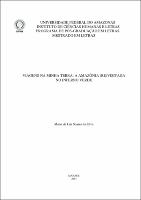| ???jsp.display-item.social.title??? |


|
Please use this identifier to cite or link to this item:
https://tede.ufam.edu.br/handle/tede/2386Full metadata record
| DC Field | Value | Language |
|---|---|---|
| dc.creator | Silva, Maria da Luz Soares da | - |
| dc.creator.Lattes | http://lattes.cnpq.br/3694993979770538 | por |
| dc.contributor.advisor1 | Aleixo, Marcos Frederico Kruger | - |
| dc.date.available | 2015-04-10 | - |
| dc.date.issued | 2014-03-28 | - |
| dc.identifier.citation | SILVA, Maria da Luz Soares da. Viagens na minha terra: a Amazônia (re)visitada no inferno verde. 2014. 130 f. Dissertação (Mestrado em Letras) - Universidade Federal do Amazonas, Manaus, 2014. | por |
| dc.identifier.uri | http://tede.ufam.edu.br/handle/tede/2386 | - |
| dc.description.resumo | Esta dissertação apoia-se na interface da literatura com a história, elegendo a sociocrítica como referência para a apreciação do livro de contos Inferno Verde cenas e cenários do Amazonas (1908), do escritor Alberto Rangel do Rêgo, em cotejo com Os Sertões (1902) e À margem da história (1909), de Euclides da Cunha. O escopo do trabalho é a reflexão sobre a identidade nacional brasileira aparente na ficção que tematiza o espaço da Amazônia com a discussão sobre o nacionalismo mestiço. Tal visão, presente na abordagem da intelligentsia brasileira de final do século XIX, contrabalançava conceitos de identidade e civilização , buscando entender o paradoxo nacionalismo versus universalismo latente em Inferno Verde, sob a preocupação de se considerá-lo literatura genuinamente brasileira. Nesse ambiente, a trajetória traçada pelo narrador viajante, testemunha do contexto histórico tematizado - a Amazônia do Ciclo da Borracha - deixou como herança uma obra em cuja leitura este trabalho intenta demonstrar o requerido como marca de autenticidade. Para isto, interessam os processos de significação subjacentes, que se materializam no objeto de estudo, acompanhando o imaginário que influenciou a impressão do viajante sobre terras jamais vistas, desde o século XVI, analisando-se também os discursos, os tipos sociais, as representações dos espaços naturais (e culturais) no contexto literário da obra Inferno Verde; os limites da linguagem na representação dos relatos da obra; as concepções sobre a gênese da obra, que guardam contato/dialogam com o olhar; e, por fim, as convicções do europeu sobre a Amazônia intocada, alimentadas por noções etnocêntricas do século XIX, as quais projetam imagens antitéticas do inferno e do paraíso amazônico. Isto posto, intentará o trabalho ter demonstrado no contexto do pensamento e da produção literária da época a figuração de Inferno Verde como uma representação literária atual, inovadora e de aspectos singulares no que se diferencia por seu estilo e visão prospectiva. | por |
| dc.description.abstract | The theme of this dissertation is based on the interface between literature and history by electing the socio-critical as a reference for assessing the storybook Inferno Verde cenas e cenários do Amazonas (1908), written by Alberto Rangel do Rêgo, in comparison with Os Sertões (1902) and À margem da história (1909), by Euclides da Cunha. The scope of work is a reflection on the Brazilian national identity apparent in fiction that thematizes the space of the Amazon, looks the discussion of the mestizo nationalism. Such a view, present in the Brazilian intelligentsia of the late XIX century approach, in mesures concepts of " identity" and " civilization ", seeking to understand the paradox latent nationalism versus universalism in Inferno Verde, under the concern to consider it genuinely Brazilian literature. In this environment, the trajectory traced by traveller-narrator, a witness of the themed historical context - the Amazon Rubber Cycle - brought us this work wich may reading as brand authenticity. To this, we must research the processes underlying meaning, which materialize the object of study, watching the imagery that influenced the traveller-narrator on lands never before seen since the XVI century, also analyzing the discourses, social types, natural (and cultural) spaces in the literary context in Inferno Verde, the weakness of language in representing the reports of the tale; conceptions about the genesis of the work, which keep contact / dialogue with the look; and, finally, the european convictions about the pure amazon myth, originated by ethnocentric notions of the XIX century, which record antithetical images of hell and amazon paradise. That said, will bring the work had demonstrated in the context of thought and literary production of the time figuring Inferno Verde as a current, innovative and unique as your style and forward looking aspects in that literary representation. | eng |
| dc.format | application/pdf | por |
| dc.thumbnail.url | http://200.129.163.131:8080//retrieve/10101/Maria%20da%20Luz%20S%20da%20Silva.pdf.jpg | * |
| dc.language | por | por |
| dc.publisher | Universidade Federal do Amazonas | por |
| dc.publisher.department | Instituto de Ciências Humanas e Letras | por |
| dc.publisher.country | BR | por |
| dc.publisher.initials | UFAM | por |
| dc.publisher.program | Programa de Pós-graduação em Letras | por |
| dc.rights | Acesso Aberto | por |
| dc.subject | Paradoxo da mestiçagem | por |
| dc.subject | Identidade Cultural | por |
| dc.subject | Narrador testemunha | por |
| dc.subject | Amazônia | por |
| dc.subject | Paradox of mestizaje | eng |
| dc.subject | Cultural Identity | eng |
| dc.subject | Narrator witness | eng |
| dc.subject | Amazon | eng |
| dc.subject.cnpq | LINGUÍSTICA, LETRAS E ARTES: LETRAS | por |
| dc.title | Viagens na minha terra: a Amazônia (re)visitada no inferno verde | por |
| dc.type | Dissertação | por |
| Appears in Collections: | Mestrado em Letras | |
Files in This Item:
| File | Description | Size | Format | |
|---|---|---|---|---|
| Maria da Luz S da Silva.pdf | 1.61 MB | Adobe PDF |  Download/Open Preview |
Items in DSpace are protected by copyright, with all rights reserved, unless otherwise indicated.




